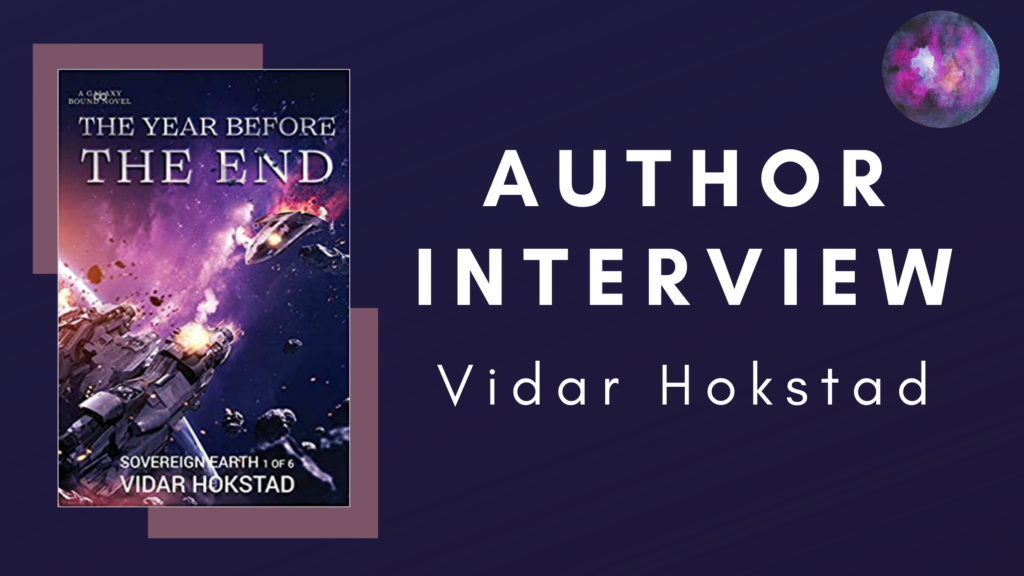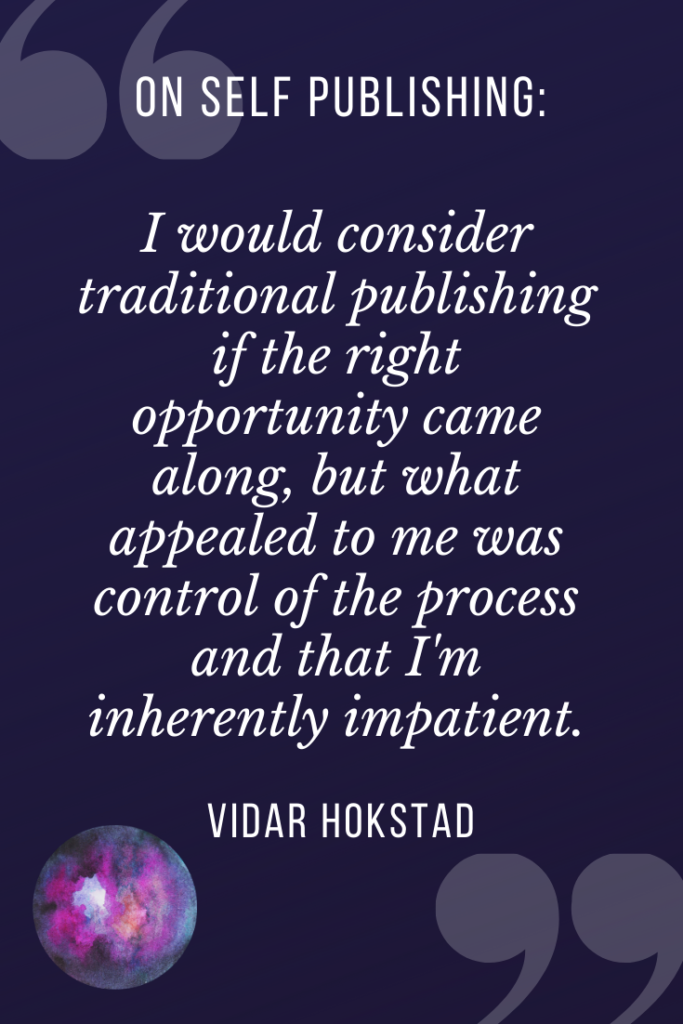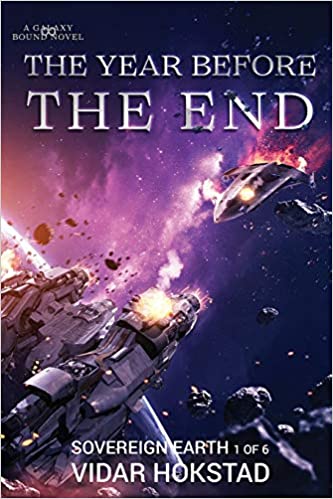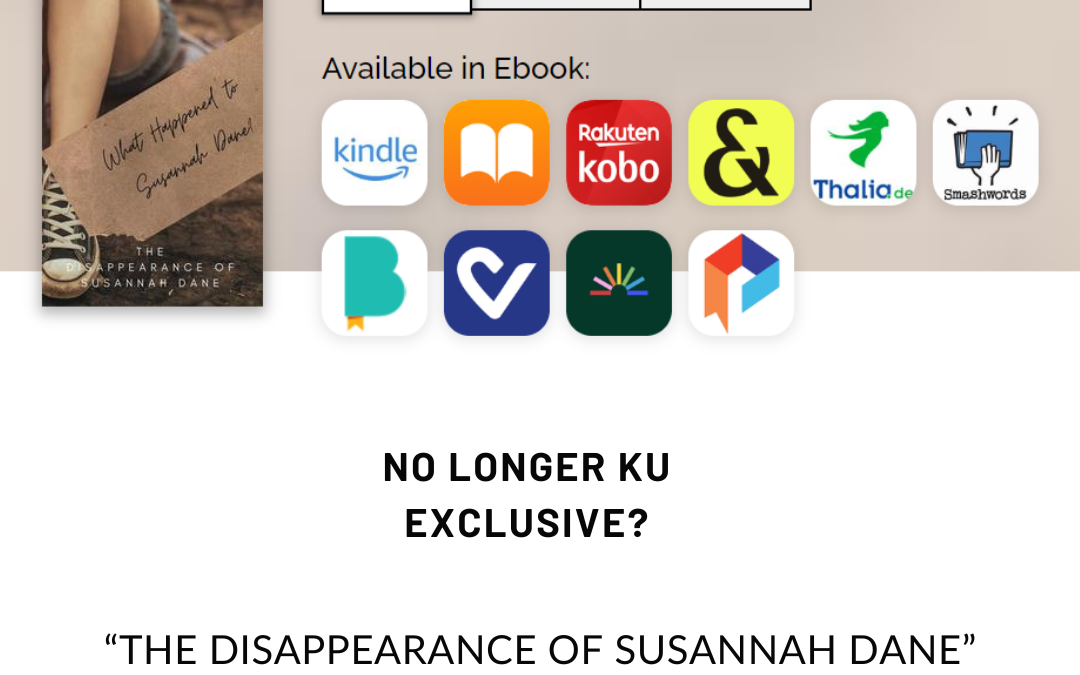Please note that this post does contain affiliate links for Amazon and Grammarly. This means I get a commission on qualifying sales at no extra cost to you.
Earlier this week, I posted a review of The Year Before the End by Vidar Hokstad. I really enjoyed the book and today, I’m sharing an interview that I did with the author! I was really excited to be able to chat with Vidar about the world that he created in this book. We also talked about the process of writing science fiction somewhat accurately and what inspired Hokstad to pursue self-publishing. The interview is just below!

Author Interview with Vidar Hokstad, author of The Year Before the End
Eliza: Vidar, thank you for sitting down to answer some questions for me! I want to say that I really loved The Year Before the End. Once I started reading, I couldn’t put it down. So, thank you for writing such a compelling story!
Vidar: Very happy to hear you liked it. And thank you for the opportunity to talk about it.
Eliza: One of the aspects that I loved the most about the characters. The entire crew of the Black Rain was great, but I especially loved Zo and Grant. You’ve definitely got a talent for creating unique characters. Did you have any specific inspiration for these characters?
Vidar: It really goes back to my inspiration for the series as a whole, a Norwegian Western series you probably haven’t heard of, called Morgan Kane. It was translated to English first a few years ago (and the translation was apparently not great), but I read it as a child, and it was very exciting. It’s very much a pulp series – quick, easy reads full of adventure and with a fast pace. It probably seems like an odd inspiration for a sci-fi series, but what I liked about it was the structure of a long series where each story can stand on itself, but there’s still forward momentum. The character ages, and changes, and time passes and the world changes around him but the core of that character remains. In that series, he’s morally ambiguous, but he becomes a Texas Ranger and then a US Marshal. What is right matters to him, even when he’s not playing by the rules.
So when I started writing, I wanted someone tough and hardened of a similar sort. Someone who could be a gunslinger in a western, and who’d do the right thing but is prepared to break rules. And, yes, originally Zo was a man. I got about halfway in before I sat down and evaluated the characters and decided I wanted to make the crew more diverse and decided there was no reason the character that became Zo needed to be male. I changed the name and the pronouns, and nothing else, because nothing else needed to change. She can have traits inspired by a stereotypically macho character and still be very much all woman and feminine.
As for Grant, I didn’t have any particular specific inspiration, but I wanted him to be a more easily swayed, less careful, and deliberate character. Someone prepared to rush in and do anything. Maybe looking for a way to be the action hero, but not with the best judgment. Especially given where he ends up. And it was important for me that he had real reasons for taking the actions he does, and that he got a chance to say why, so it’s not black and white.
Eliza: I loved the idea of this subculture of techies that are using augmentation, or body-modifications, in order to get an edge on the competition. There’s a ton of possibilities with a plot device like that. How do you keep it from drifting into fantasy territory?
Vidar: I think a lot about that. I love more fantasy-style sci-fi like Star Wars as well, but I want things to be plausible wherever possible (FTL travel being my one big “indulgence” in this respect so far). But in terms of this, my main way of not drifting into fantasy is to take cues from real science. One of my favorite examples of this is how Jules Verne wrote a novel called “Paris in the Twentieth Century” which included things like apparent predictions of the fax. Awesome, right? Except in 1860, the signature of the composer Rossini was sent 140km via the Pantelegraph, a fax precursor, and by 1865 France had a commercial Pantelegraph-service between Paris and Lyon. A lot of Verne’s “fiction” was reality in some form already when he wrote it. Just not well known to the public. To quote William Gibson: “The future is already here – it’s just not evenly distributed”.
So with respect to the tech in general, and the augmentation in particular, I try to where possible stick to things that either exist or that can be reasonably extrapolated from things that exist. For the contact-lens displays, this is tech people are working on today, such as Mojo Vision. I love the visuals of transparent or holographic style displays in sci-fi movies and series, but carrying devices around feels like it will very quickly be dated. But when you consider contact-lens displays it becomes natural to ask if it wouldn’t be better if it was the whole eye. The human eye is a mess – the optic nerve exits through the retina, hence the blind spot, for example. It’s just an awful design.
And the idea of bypassing the eye has a basis in real experiments too. Specifically, one experiment that has stayed with me for years was one I first read about in Wired (#10, 2009). They ran a story called Vision Quest (with an incredible cover), about a man who had an interface implanted in his brain to give him some degree of sight via a cable attached to a computer system and then to a camera. So Clarice’s eye implant is based on the assumption of being able to shrink a system like that down and making it unobtrusive enough, on one hand, and being able to improve the interface to the brain enough to match normal sight on the other. In the book, her sight is “superhuman” but note that the interface to the brain doesn’t need to be – the volume of an eye just need to be able to contain enough electronics – and that we can do already today. Given the ~125 year timeframe that seems almost pessimistic to me, but the important part is that there’s enough indication that this is “just engineering”. There’s no unknown science involved.
If anything, my biggest worry is that I have to (and will) explain away some areas where the setting I’m creating is not advanced enough given how far in the future it’s set relative to current progress in e.g. machine learning. It’s a very flawed world that’s hit all kinds of dead ends in science, and that will come to the fore more in future novels. I’ve had to make the setting imperfect and limited to be able to tell the story I want because I don’t think that the world can exist otherwise.
Eliza: That is so interesting. It is amazing how sometimes the precursors for technology make the innovations seem obvious. I know you come from a technical background and this book is hard science fiction. How much research did you do before sitting down to write it?
Vidar: I didn’t do much before I started. But I got to the point of the raid on the Vanguard space station and then hit a wall the first time around because I wanted to describe it as realistically as I could. I actually toyed with doing a 3d model, because trying to get an idea of what the size of a cylindrical style station that scale will feel like is hard.
I used that as an excuse to set aside the writing for a very long time, actually. When I picked it up again, I still had to deal with that issue, and I’m honestly still not sure I got it right, but I think that given the size I indicated it’d feel more claustrophobic than many designs for stations of that type seems to assume, and I got to that by considering real-life deep valleys, which “only” have steep walls, rather than “walls” that go all the way around and meet. A well-known one from Norway, where I’m from, is Rjukan – a small town that during winter doesn’t get direct sun at all.
The other main research I did was to look up rotation speeds and adjust the diameter of the stations etc. (thanks to a very useful tool called Spincalc) to get numbers that made sense because of that. That part is largely down to it being a pet peeve of mine how much sci-fi that just handwaves away gravity (with e.g. Expanse being a very honorable recent exception). But that has a surprisingly wide impact. When you consider the consequences of rotating space stations and rotational elements for ships, all kinds of things start getting hard, and you may have noticed it impacts the descriptions of docking ports in particular, and that turned into a plot point. The three main stations described have three wildly different docking areas that affected how the story unfolds in different ways because the rotation turns the docking points into defensive positions that take more effort to avoid. I spent more time than I’d care to admit thinking about what effect different docking arrangments have on station defense and how you might flee different types of station. Someone will probably still soon enough tell me why I’m wrong… That’s ok.
Eliza: It would be impossible to get every detail correct, I’m sure! This book is one of six and I saw on your website that you stated that you intend to finish publishing the series by 2022. Have you already written the other novels?
Vidar: I’ve written the second (editing it now), started on the third, and mapped out the rest. I wrote the first draft of the second one in about 3-4 weeks, so I’m hopeful that timeline will hold, though I’m toying with making the following books (#3 onwards) a bit longer – I’ve planned out about twenty thousand words more for book 3.
Eliza: You and I have something in common, which is the intent to self-publish from the beginning. What appealed to you the most about self-publishing? Would you consider traditional publishing for future projects?

Vidar: I would consider traditional publishing if the right opportunity came along, but for me what appealed to me was control of the process and that I’m inherently impatient. I looked at submission processes and saw people estimating up to a year for a reply. And those same people did not want me to submit multiple places. And then many of them prefer dealing with agents, who also take time to consider you. And then you know odds are good you’ll be rejected a few times, and there’s a risk you’d keep getting rejected. All in all, it may take you many years to get your first book out. I expect to have my first 6-book series completely published within less than 2 years from finishing the draft of the first one.
So some of it is impatience. Some of it was fear of rejection, though driven more out of a fear of losing time and momentum as self-publishing would always be a viable fallback. Some of it was pure ego – an unwillingness to accept it if I were to be rejected because I felt confident I had something worth publishing. But most of all I see it as a divergence of goals. With traditional publishing, you’re constantly competing not just for readership, but for your publisher to put resources behind you. If you hit it big, you’ll get it. But if you don’t, you’ll struggle, even if your sales number are good enough to justify writing, they’re not necessarily going to be good enough for your publisher to put resources into marketing you, or even publish you at all. With self-publishing, you have full control over what returns you need for it to be worth it, and what you invest.
Overall I think self-publishing guarantees you something, while regular publishing increases your odds of massive success. But the odds of a massive success remain small in both cases, so guaranteeing that I get my books out there and get something back is more important to me. So it’s a tradeoff, and I don’t think either one is inherently better or worse. If your goal is fame, then you should do regular publishing. If your goal is to win big, and you’re happy with taking the risk of failing hard, then you should probably do regular publishing. If you want predictability and is prepared to build things up slowly over time, and/or you want full freedom and you want it now, then self-publishing should at least be in the mix you consider.
Eliza: Thank you again for taking the time to answer my questions! Please share the links to your social media and let the people know where they can find your books.
Vidar: You’re welcome. As you can tell I enjoy being asked to talk about this stuff..
You can find my book on Amazon (US Link) and my Amazon Author Page. You can also always find info on my website, which contains info on my books as well as my blog and the occasional free short story. I also have a mailing list that you can sign up for from my website – if I release something new, they get to hear about it a few days before the rest.
I’m also on Twitter: @BoundGalaxy is my “noisy” account, where I tweet and retweet lots of mostly sci-fi related stuff, but also some other stuff. It’s also the best one to follow if you want to interact with me personally (within reason…). @GalaxyBoundNews is low volume if you just want to hear about things directly relevant to my books.
—
A big thanks to Grammarly! I used Grammarly when double-checking that this post was in tip-top shape. The browser plug-in makes spell checking easy, whether you’re posting on Twitter or writing a blog post! There is a free version of Grammarly, so I highly suggest you check it out if you frequently post online or send emails.





Lorem ipsum dolor sit amet, consectetur adipiscing elit, sed do eiusmod tempor cididunt ut labore et dolore magna aliqua. Ut enim ad minim veniam, quis nostrud exercitation ullamco laboris nisi ut aliquip. Tori Barris Salita
Muy bien expuesto el tema y con amplias miras,muy bien trabajado,aconsejo su lectura a los que tengan alguna duda al respecto Cristabel Bradley Shear